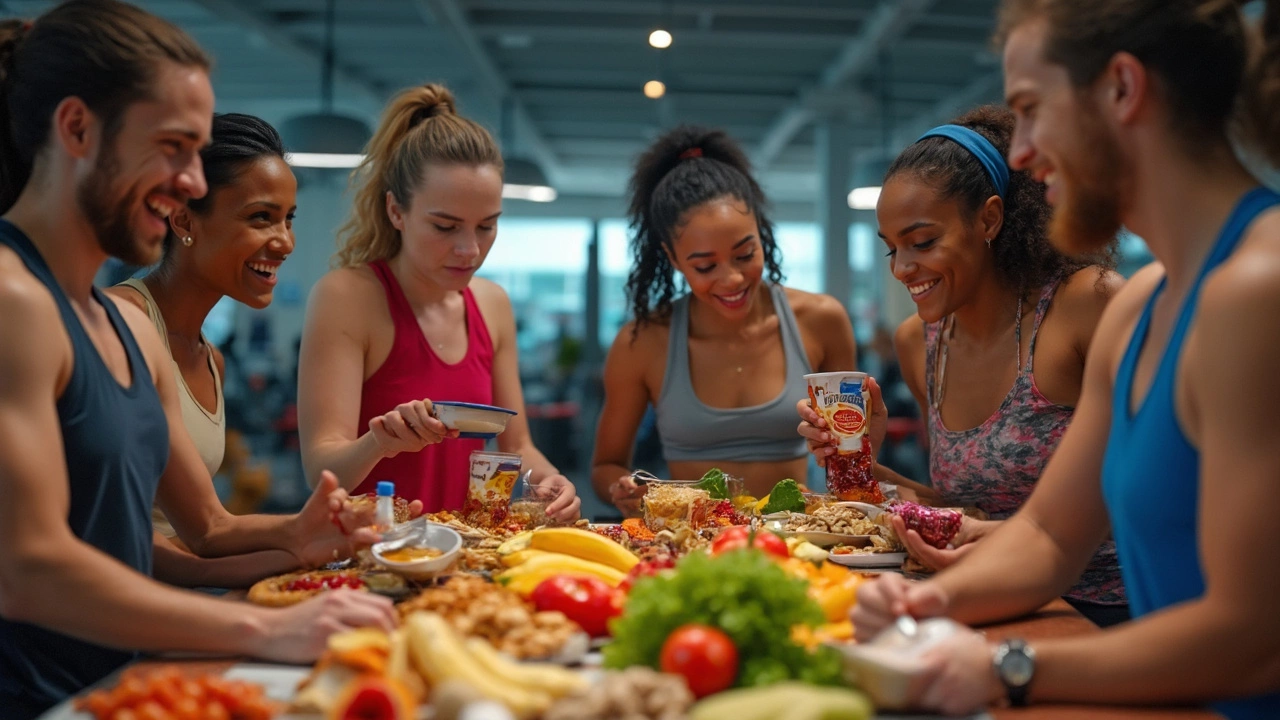Best Foods for a Successful Gym Session

Ever wondered why some days you're a powerhouse at the gym while other days you can't lift a feather? It could be what you're eating! Getting the right food into your system can make or break your workout session. Pre-workout foods are key and should ideally be packed with carbs for quick energy and a bit of protein to help muscle recovery right from the start.
Grab a banana or oatmeal to stay energized without feeling too full. If you're into morning workouts, even an apple with a dollop of peanut butter will set you up nicely. After hitting the weights or cardio, post-workout foods like chicken, mixed with whole grains or a protein shake, can really help with muscle repair and growth.
- Pre-Workout Nutrition Essentials
- Post-Workout Recovery Foods
- Hydration Tips for Gym Success
- Timing Your Meals for Peak Performance
- Adapting Foods to Your Fitness Goals
Pre-Workout Nutrition Essentials
Hitting the gym without the right fuel? That's like trying to drive a car on empty. Eating the right pre-workout foods is crucial for getting the energy and focus you need. Let's break it down.
Why Carbs and Protein Matter
Carbs are your body's main source of energy. Before your workout, pick carbs that are easy to digest, like fruits or whole grains. They give you the energy boost to keep you going strong.
Protein isn’t just for bodybuilders. Having a small dose before you sweat can enhance performance and start muscle recovery. An egg or a small piece of chicken could do the trick.
Ideal Foods for Before You Work Out
- Bananas: Packed with carbs and potassium, which support muscle function.
- Oatmeal: A classic choice that's filling but not overwhelming. Add a touch of fruit for extra flavor.
- Greek Yogurt with Berries: Gives you both protein and carbohydrates, deliciously.
Remember, timing is key. Aim to eat your gym nutrition about 30-60 minutes before working out. This allows your body to start digesting but not so much that you feel sluggish.
Stay Hydrated
Don’t forget water. Hydration is just as important as what you're eating. Make it a habit to drink water before, during, and after exercise. A pro tip? Bring along a water bottle to fill as you go.
Post-Workout Recovery Foods
Once you've wrapped up your gym session, it’s time to think about recovery. Eating the right foods after working out is as crucial as what you eat before. Why? Because that’s when your muscles are begging to be fed to repair and grow stronger. Recovering well sets you up for your next session, so let's see what foods can help you get there.
Why Post-Workout Nutrition Matters
After you exercise, your muscles use up their glycogen stores and create microscopic tears. It's important to eat protein and carbs to replenish what's lost and get those muscles back in shape. This combo fuels your recovery far better than either would alone.
Top Foods for Recovery
- Chicken or Turkey Breast: Lean and packed with protein, perfect for rebuilding muscle.
- Quinoa or Brown Rice: These complex carbs pair well with lean meats to aid muscle repair.
- Greek Yogurt with Berries: High-protein yogurt mixed with berries offers antioxidants, helping to reduce inflammation.
- Fish like Salmon: Rich in omega-3 fatty acids, supporting muscle inflammation reduction.
Make sure to consume these within 45 minutes to an hour post-workout to maximize recovery benefits.
Hydration is Key
Don’t forget about hydration! Water or drinks with electrolytes are needed to replace what you’ve sweat out. Proper hydration complements your recovery foods perfectly.
| Food | Key Nutrients |
|---|---|
| Chicken Breast | Protein, Low Fat |
| Brown Rice | Carbs, Fiber |
| Salmon | Omega-3, Protein |
| Greek Yogurt | Protein, Calcium |
Pair these meals with hydration and you’re not just recovering, but also prepping your body for the next day. Choosing the right post-workout recovery foods can make all the difference!

Hydration Tips for Gym Success
Staying hydrated may sound like a no-brainer, but you'd be surprised how often it's overlooked. Proper hydration is just as important as the right gym nutrition or workout food. Water keeps your energy levels up and helps your muscles work effectively. You lose a ton of fluids through sweat during exercise, so topping up is essential.
How Much Should You Drink?
Before you hit the gym, aim to drink about 500ml of water an hour or two before. Then, sip on around 200ml every 15-20 minutes during your session. After, replenish with at least 500ml more. But be conscious of your personal needs—if you sweat a lot, drink more!
Spotting Dehydration Signs
Feeling dizzy, having a pounding headache, or experiencing muscle cramps? These are telltale signs you're dehydrated. If you notice them popping up, pause and hydrate!
Water vs. Electrolytes
For moderate workouts, water does the trick. But for extended or intense sessions, especially in sweltering conditions, electrolyte drinks can be a game-changer. They not only replace fluid losses but also the essential salts lost through sweat.
Extra Hydration Tips
- Drink cool, not cold, water to avoid stomach discomfort.
- Carry a reusable water bottle; it’s a constant reminder to sip regularly.
- Try adding a splash of lemon or lime to your water for taste and an extra vitamin boost.
By hydrating smartly, you’re setting yourself up for success and getting one step closer to those fitness goals!
Timing Your Meals for Peak Performance
When it comes to smashing through barriers at the gym, when you eat can be just as important as what you eat. If you're looking to boost workout performance, the timing of your meals should be part of your strategy.
Pre-Workout Timing
Let's kick things off with what happens before you hit the gym. You generally want to have a snack 30 minutes to an hour prior to your workout, and your bigger meal a few hours before that. The idea is to fuel your body with enough energy without making you feel sluggish. Think carb-heavy snacks like a small fruit smoothie or a couple of rice cakes with honey.
Post-Workout Timing
After you’ve powered through your session, the clock is ticking again! It’s ideal to have your post-workout meal within 30 minutes to 2 hours after exercising to kickstart recovery. This meal should be rich in protein to aid muscle repair, along with carbs to replenish glycogen stores.
- Grilled chicken with sweet potatoes
- Quinoa salad with chickpeas
- A balanced protein shake
Fitting in these meals correctly can make a substantial difference in how your body rebuilds post-gym.
Balancing It All
Navigating meal timing might seem complex, but it doesn't have to be. Think of it like this: if your workout is intense and longer than an hour, lean more towards carb-rich snacks beforehand. For lighter sessions, a snack or just a meal a few hours before could suffice.
| Activity Type | Ideal Meal Timing |
|---|---|
| Intensive Cardio/Weights | Snack: 45 mins prior; Meal: 2-3 hours prior |
| Light Yoga | Small snack if needed; Meal: 2-3 hours prior |
Remember, these are guidelines. Listen to your body, adapt as you learn what works best for boosting your fitness outcomes. Timing nutrition can really leverage results, pushing you closer to those ambitious goals!

Adapting Foods to Your Fitness Goals
When you're aiming for specific fitness goals, tweaking your diet can really help you get there faster. Whether you're trying to bulk up, slim down, or enhance endurance, the key is in the details of your food choices.
Building Muscle
If gaining muscle is your aim, protein is your best friend. Foods like lean meats, eggs, and legumes should be your go-to. Aim to include a source of protein with every meal, and don't forget those carbs either—they fuel your workouts. A classic chicken and rice dish or a hearty bowl of lentil stew can do wonders.
Losing Weight
For weight loss, it's about creating a calorie deficit while still maintaining energy levels. Focus on foods that are higher in volume but lower in calories, like veggies and fruits. You can swap processed carbs with whole grains to keep you full longer. Avoid skipping meals; instead, opt for smaller, frequent meals to keep your metabolism humming.
Boosting Endurance
If your aim is to boost endurance, such as for running or cycling, make sure your diet is rich in carbs. These are stored as glycogen in the muscles and are a crucial energy supply. Think pasta, sweet potatoes, and whole grain breads. Also, hydration plays a huge role, so keep sipping water throughout the day.
Understanding the role of nutrition in your fitness journey can completely change the game. Remember, it's about aligning your food choices with what you want to achieve in the gym. It's not just about the hours you grind away at your workouts, but also what's going on in your kitchen.
